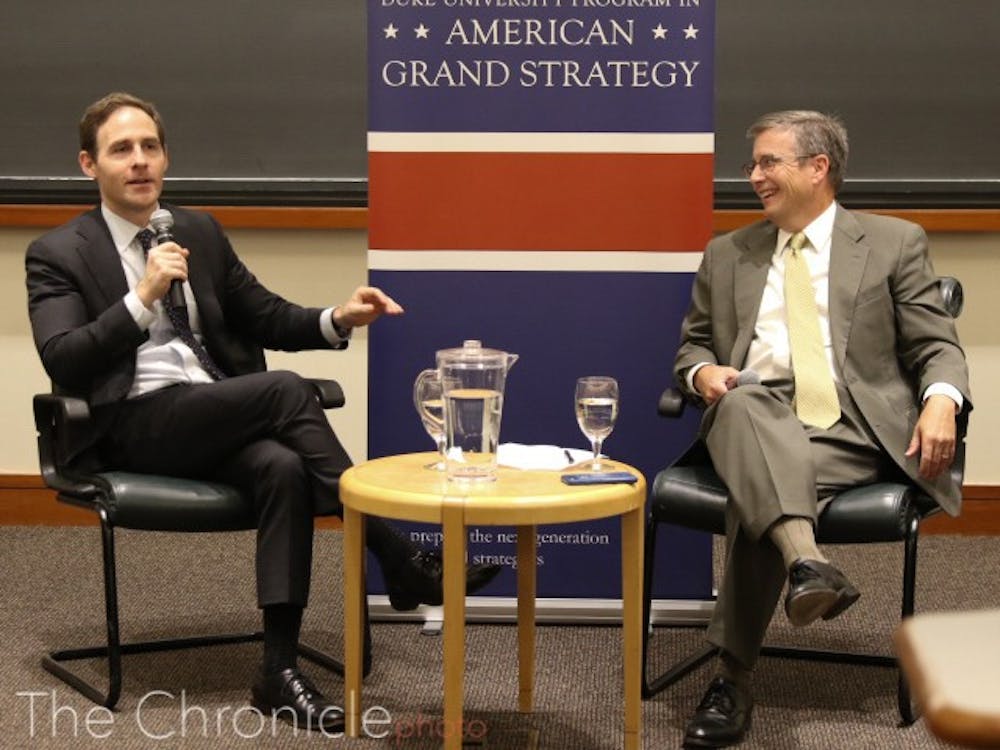By Chris Kuo
Eric Lorber, a former American Grand Strategy graduate fellow, defended the use of economic sanctions in statecraft at a Monday event hosted by the AGS program and moderated by Peter Feaver, professor of political science and director of the program.
Certain types of sanctions are useful because they allow the United States to exert pressure on a group without the aid of other countries, he explained. Lorber, who earned a master’s degree in political science from Duke, now works as senior director of the Center on Economic and Financial Power at the Foundation for Defense of Democracies and as a director of the Financial Integrity Network, an advisory firm.
“So much of the power of the U.S. sanctions is actually power that can be derived unilaterally,” Lorber said. “The sanctions efficacy, or coercive leverage, is actually far more rooted in the power of the U.S. financial system than it is in the significant multilateral efforts.”
Lorber pointed to U.S. sanctions against Russian elites that prohibit specific financial transactions. These sanctions work because they cut the targets off from the global financial system, which continues to be dominated by the dollar.
However, there are downsides to these kinds of sanctions, he asserted. Once sanctions are put into place, for instance, they are difficult to fully remove. Another fear is that China and Russia may react to U.S. sanctions against other allies by eventually developing an enclosed financial system based on cryptocurrencies, completely bypassing dollar-based international institutions.
Increased sanctions also led to evasive mechanisms by countries and individuals. Lorber gave the example of North Korea, which has found loopholes to become self-sustaining even as it faces the most severe sanctions regime from the U.S. of any country. Likewise, Iran has begun to take similar measures to resist U.S. sanctions, such as changing the names of ships and dodging economic barriers.
The key, Lorber explained, involves finding the right set of sanctions to fulfill policy goals without resulting in long-term negative side effects.
It’s a question of the kinds of sanctions that will incur “longer term impacts that are positive” in comparison to those that could “undercut U.S. sanction power over a longer period of time,” Lorber argued.
Lorber also outlined the history of economic sanctions in U.S. foreign policy, dividing it into three stages. The first, from the mid 1970s to the mid 1990s, involved “comprehensive sanctions programs” in which the U.S. and the United Nations imposed blanket sanctions against countries like Iraq, he said.
Because this type of sanction often inflicted unintentional suffering on the general population, U.S. policymakers shifted to a more individualized approach, Lorber said, an approach that achieved popularity in the late 1990s and early 2000s and fully came into its own after 9/11. According to Lorber, U.S. policymakers realized that individualized sanctions could effectively target the people involved in terrorist groups like al-Qaeda.
The last transition in economic statecraft occurred around 2010, when policymakers began to require banks and other financial institutions to undercut the funding for terrorists, drug kingpins and the like. This led to the modern approach of severing targets from the international financial system, which Lorber said gives sanctions “much more teeth.”
Lorber spoke to his personal involvement in U.S. sanctions, as he formerly worked at the Office of Foreign Assets Control in the U.S. Department of Treasury.
“I wish I could tell you some incredibly courageous story of operating in the shadows,” he said, jokingly referring to “Jack Ryan: Shadow Recruit,” a movie in which economic warfare was featured prominently.
In actuality, Lorber said, he and his colleagues must do the behind-the-scenes work of gathering intelligence on a potential target, collecting information on suspicious activity from banks and weighing the collateral consequences to possible sanctions.
“People think about sanctions as this kind of sexy tool of US foreign policy, and at a high level it is,” Lorber said. “But at a granular level, at a daily level, it’s hard work, it’s intelligence and it’s getting everything cleared by the interagency and the lawyers.”
Senior Bo Carlson, an AGS student council member, said after the event that it was “inspiring to hear a speaker who had been involved in AGS, graduated from Duke and who [is] now working in government and implementing policy.”

No comments:
Post a Comment